 In today’s knowledge-based economy, much discussion centres around the importance of clustering. For example, in financial services, cities like New York, London and Toronto have all benefited at the expense of smaller rivals (eg. Philadelphia, Paris and Montreal or Vancouver). Likewise, as entrepreneurial technology startups have spread around the world, the Silicon Valley remains a magnet and model for that magic blend of people, ideas and capital aspiring to create the next Microsoft or Google. Furthermore, in spite of the world-flattening ascendency of information technology over the last decade, in some ways, the forces of such clustering seems to have increased.
In today’s knowledge-based economy, much discussion centres around the importance of clustering. For example, in financial services, cities like New York, London and Toronto have all benefited at the expense of smaller rivals (eg. Philadelphia, Paris and Montreal or Vancouver). Likewise, as entrepreneurial technology startups have spread around the world, the Silicon Valley remains a magnet and model for that magic blend of people, ideas and capital aspiring to create the next Microsoft or Google. Furthermore, in spite of the world-flattening ascendency of information technology over the last decade, in some ways, the forces of such clustering seems to have increased.
Being domiciled in Canada, and having built transatlantic technology companies over the years, led me to ponder Chris Anderson‘s recent endorsement of distributed workface in which he “builds companies that are distributed because that’s where the best people are.”
So, what’s the stronger force: clustering or distributed teams? First, let’s dig a bit into history so we can follow this trend.
The 1980’s: Selling Software in a Pre-web World
In the late 1980’s, an otherwise bright, young MBA student advised MKS to conquer local markets (ie. Waterloo Region) before going national and only then to export markets. While this may have made sense in traditional industries, we had the good sense to ignore this faulty gem of wisdom. Instead, reckoning that a dollar spent marketing in the US would reach about 10 times the audience as one dollar spent in Canada, we rejected this advice and focused from day one on selling our first product (MKS Toolkit) into the US market. To provide some context to modern readers, in these pre-web times software companies put ads in the back of magazines with dealers with geeky names like Programmer’s Shop and Programmer’s Paradise, with a several month cycle from ad spend to results. It’s easy to forget that, in those days, software companies had a “manufacturing” group which duplicated diskettes and shrink-wrapped them in boxes with physical manuals. Our main tactic to overcome geography was to use a North America-wide toll free 800 number to mask our country of origin, at least for first customer contact.
In my case, it helped that I had my first software startup experience in the US while building Coherent. This gave me direct operating experience in the Silicon Valley from the beginning. While importing that model of company development back to Waterloo probably wasn’t a 100% fit, it did serve to shape our biases in company structure to a very large degree.
The 1990’s: The Israeli Model
As the 1990’s unfolded, better IT systems, lower cost telephony and the emergence of the internet, web (and its precursors such as AOL), created an environment that was ideal for what I call the “Israeli Model” of technology company formation. In this model, R&D and “back office” functions resided in Israel, while much of the sales, marketing and business development (ie. the storefront of the company) was in the US – typically in the Silicon Valley. Companies like Aladdin, Checkpoint Software and Mercury Interactive all are good examples from the 1990’s.
Why did this model make sense? Israel is a small country with a tiny home market, having a population of just over 7 million. At the same time, it is a rich country (22nd in GDP per capita) with extremely high educational standards and a military establishment that was pushing the boundaries of research into many IT-related disciplines. Thus, Israel was an ideal cluster of brainpower and ideas to create new technology startups. However, the market was elsewhere. Between Tel Aviv and San Francisco there is an inconvenient, and inescapable, 10 hour timezone difference and up to 20 hours of flying time. To help overcome this a bi-modal company structure evolved, often with half of the staff (the back end) in Israel and the other half (the front end) in the USA. It’s a time tested model that has proven remarkably resilient.
As a result, despite its apparent disadvantageous geographic location, today Israel is second only to America in the number of NASDAQ-listed companies, and the Economist says that “the country attracts twice the number of venture-capital (VC) investments as the whole of Europe”.
It may seem odd, given how close Canada is to the US, to suggest that the same model made sense for Canadian companies as well. However, especially in the 1990’s, these key business drivers were essential to MKS or any other Canadian technology company with global aspirations:
- corporate image: many Americans like to buy local, so having a strong (front end) presence in the US will definitely improve both the sales, and even investment and valuation, prospects of the company.
- senior talent: sales and marketing executives with expertise in the software industry were effectively nonexistent in Canada. MKS source both its VP Sales and VP Marketing from the US. It was a great choice that allowed us to access top talent from major competitors. Furthermore, these executives provided mentorship, by acting as role models for the Canadian-based employees.
This was a virtuous circle, in which better US image helped to increase company value, attract ever better talent and ultimately should provide long term exit options.
Why not split the R&D organization as well? Notwithstanding our adoption of the Israeli Model, MKS resisted moving to multiple development locations until the very late 1990’s. Ironically, being a company that sells software to manage multi-site development, the state of the art in telecommunications and software adoption was still too primitive in those days and face to face communications continued to be critical. However, as the internet and bandwidth continued to develop and once MKS embarked on a series of acquisitions across the US, we did invest heavily in the new, IP-based room conferencing systems to knit geographically dispersed teams. It remains clear that until very recently, a single location for development has been preferable, particularly in the formative, early stages of product innovation.
Best Practices Today
Today, we live in a business world that routinely accepts offshoring, virtualized management, distributed teams, etc. Tools like Basecamp, Enterprise Wikis, iotum‘s rich conferencing, and even instant messaging for real time back channel, all make distributed innovation sessions (aka meetings) much more practical. What is most interesting is the fact that video plays only a very small part in all of this.
After years of evolving startup playbooks, we may be finding the right balance between the more traditional “Israeli Model” and the fully decentralized team as espoused by Chris Anderson. At Coreworx (Software Innovation), we moved the company to Waterloo largely to gain synergies, at a critical early stage, in what was then a 20 person team. So, there are clearly some benefits that remain from people interacting face to face and always will be. The most creative and innovative processes may well work best only when conducted in person. Further more, with the rise of mobile nomadism, less and less work seems to be conducted in the traditional office setting.
That being said, each year we seem to be able to achieve more by ignoring geography and building around the best talent. Conversely, I have a feeling that the convivial, chalkboard-centric environment at Waterloo’s Perimeter Institute may well be crucial to the breakthroughs in fundamental physics that institution will undoubtedly generate. What is your take on the necessity of clustering talent?



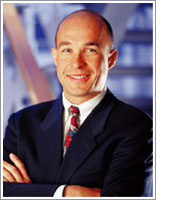 Jim Balsillie
Jim Balsillie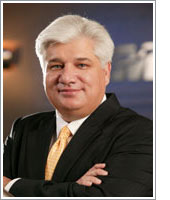 Mike Lazaridis
Mike Lazaridis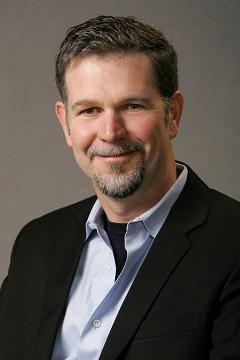 Reed Hastings
Reed Hastings


 No, not like this!
No, not like this!

 In a world full of change, do maturity and learned experience continue to have value? Absolutely. Serial entrepreneurs learn to “replay a tape” of past successes, and even more importantly, to avoid pitfalls that have bedevilled them in the past. However, replaying the tape is much more complicated as the pace of change accelerates. A good analogy is that you are replaying the tape as the format transitions through
In a world full of change, do maturity and learned experience continue to have value? Absolutely. Serial entrepreneurs learn to “replay a tape” of past successes, and even more importantly, to avoid pitfalls that have bedevilled them in the past. However, replaying the tape is much more complicated as the pace of change accelerates. A good analogy is that you are replaying the tape as the format transitions through 
 If you want to learn from first hand from Ariane de Bonvoisin on the subject of “Taking Charge of Change”, or even ask your own questions, sign up for her 21 August, 2008
If you want to learn from first hand from Ariane de Bonvoisin on the subject of “Taking Charge of Change”, or even ask your own questions, sign up for her 21 August, 2008 
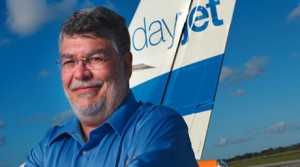 Ed Iacobucci, CEO Dayjet
Ed Iacobucci, CEO Dayjet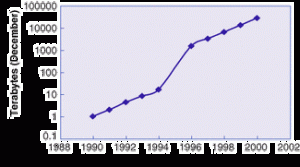 For every Ed Iacobucci, there were many dot com era fibre and telecom firms that, despite all hard data to the contrary, ran their businesses into the ground on the false proposition that the
For every Ed Iacobucci, there were many dot com era fibre and telecom firms that, despite all hard data to the contrary, ran their businesses into the ground on the false proposition that the 
 Blackberry Pearl – Convergence of Network and Information
Blackberry Pearl – Convergence of Network and Information “Surfing the web on a Blackberry is like trying to prepare dinner for four with an Easy-Bake” Oven.
“Surfing the web on a Blackberry is like trying to prepare dinner for four with an Easy-Bake” Oven.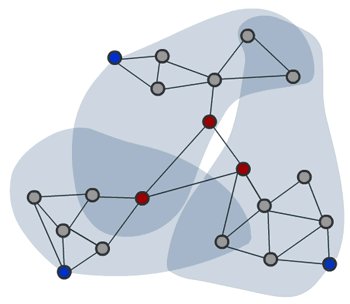

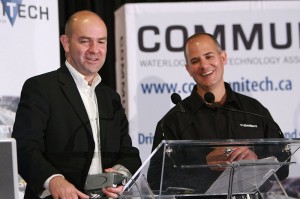 First of all, Chris Anderson, editor of
First of all, Chris Anderson, editor of  The interplay of the two Chris’s (Anderson and Sacca) with later keynote Jeff Taylor (
The interplay of the two Chris’s (Anderson and Sacca) with later keynote Jeff Taylor (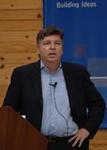 Again, major kudos to Communitech for pulling this remarkable event together. It is a real step forward for the Waterloo startup scene. To illustrate, less than three years ago, at October 2005 Entrepreneur Week, when Tony Perkins (
Again, major kudos to Communitech for pulling this remarkable event together. It is a real step forward for the Waterloo startup scene. To illustrate, less than three years ago, at October 2005 Entrepreneur Week, when Tony Perkins (
31 Aug 2008
0 CommentsHow to Get Rich Quick With a Startup?
It’s surprising how often an aspiring entrepreneur or young technology executive has tried to pitch me with that implicit proposition. And, guess what? When I hire executives, invest in a company or otherwise have to work on the same team, such “get rich quick” rhetoric suggests the best course is to steer well clear.
The notion that a real business, with lasting value, could be built in a few months or years seemed to take hold, like much else, during the heady “tech bubble” days of the late 1990’s. I can recall one such aspiring entrepreneur telling me that “we should be able to flip this business in 18 to 24 months”.
Why is such hubris a problem? For starters, it shows a healthy naivety around the amount of real work and time it takes to build a great business. Of course, there may be exceptions. Against the odds, some people winn the lottery. Likewise, in normal times, some seem to be able to build and cash out in record time. In my book, that’s largely serendipity. In addition, this short term perspective, almost always accompanies inexperience around the twists and turns that cause most business plans to take longer than originally anticipated.
And, more fundamentally, I got involved in software and technology originally as a passion. I remember saying in my early days that working in computers was “so fun, that I didn’t need to be paid for it.” Every company I’ve ever started, worked with or invested in has become a personal passion of mine. I strongly believe that long term success is rooted in passion more than money. Furthermore, it is my personal experience that almost every long term successful technology entrepreneur has shared this characteristic.
For those set on the notion of “get rich quick”, there’s still the lottery or Texas Holdem, the probabilities notwithstanding. But, building a great business almost always takes a tremendous investment of time and effort.